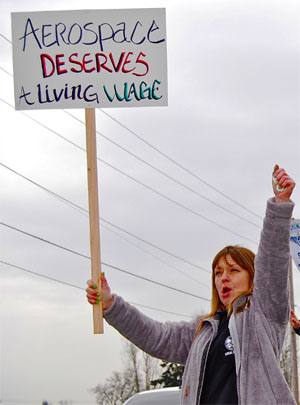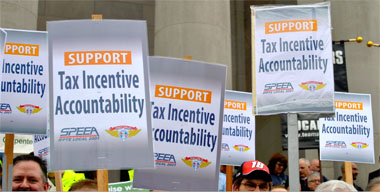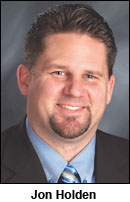OPINION
Why subsidize low-wage aerospace jobs in Washington?
By JON HOLDEN
(April 15, 2015) — Today, low-wage workers across America are taking action to demand a $15 an hour minimum wage and the right to form unions to negotiate with their employers.
Here at Machinists Union District Lodge 751, we salute those hard-working people — fast food and home care workers, and even part-time college professors. Their actions today on behalf of themselves and others like them are to be commended.
 But while the headlines and TV cameras will be focused today on them, we here at District 751 feel Washington state residents must look to another large group of underpaid workers — the employees of Washington state’s taxpayer-subsidized aerospace supplier network.
But while the headlines and TV cameras will be focused today on them, we here at District 751 feel Washington state residents must look to another large group of underpaid workers — the employees of Washington state’s taxpayer-subsidized aerospace supplier network.
We have an image in our mind that aerospace is a good blue-collar career, one that provides good wages and benefits to highly skilled people who work the factory jobs. That’s certainly true for those who have joined a union; union Machinists at Boeing earn on average more than $31 an hour.
But the reality is that a large portion of Washington’s non-union aerospace manufacturing workers are living in poverty. Looking at the available state data, we estimate that close to 7,000 people working for Boeing suppliers in Washington are paid $15 an hour or less.
Here’s what that means for them: A life dependent on charity and government programs to provide food, housing and medical care for themselves and their families that they can’t afford on their own, because their taxpayer-subsidized employers literally don’t pay them enough to live on.
This week, the University of California reported that nationwide, U.S. taxpayers spend $153 billion each year to provide food, shelter and medical care to workers whose employers don’t pay them enough to live on.
Here in Washington state, that same study found, taxpaying citizens spend $993 million annually to provide food stamps, medical care and other basic needs of low-wage working people. On top of that, the federal government spends another $4 billion of our money a year to provide those services to our state’s residents.
 Adding insult to injury, while you and I are providing food stamps for 289,000 Washington state workers who can’t afford to feed themselves or their children, we’re also on the hook for $8.7 billion in tax incentives that we owe to companies in one of our nation’s fastest-growing and most-profitable manufacturing sectors: aerospace.
Adding insult to injury, while you and I are providing food stamps for 289,000 Washington state workers who can’t afford to feed themselves or their children, we’re also on the hook for $8.7 billion in tax incentives that we owe to companies in one of our nation’s fastest-growing and most-profitable manufacturing sectors: aerospace.
That’s right, we as taxpaying citizens are giving tax handouts to hugely profitable, multinational companies that create jobs that are burdens to our communities. It’s double-dipping of the worst kind, and it violates our basic notions of fairness, fiscal responsibility, basic humanity — and common sense.
So what do we do about this?
A few say that we can’t do anything: We’ve made an agreement with Boeing and its suppliers and we can’t change the terms of it now — even though it’s clear that we must balance the equation to benefit the Washington taxpayers who are footing the bill.
To that we say this: Groups like the Aerospace Futures Alliance are in Olympia every year, lobbying legislators for changes in tax laws that are favorable to Boeing and its suppliers. We see nothing wrong in proposing changes to balance the equation more favorably toward Washington citizens.
 So our union, along with the Society of Professional Engineering Employees in Aerospace/IFPTE 2001 (SPEEA), is working with legislators to pass two pieces of aerospace tax incentive accountability legislation. One of them, House Bill 1786, would stipulate a wage standard that would ensure aerospace companies are paying their experienced workers at least as much as the typical Washington state worker makes — the state’s median wage, currently $19.67 an hour.
So our union, along with the Society of Professional Engineering Employees in Aerospace/IFPTE 2001 (SPEEA), is working with legislators to pass two pieces of aerospace tax incentive accountability legislation. One of them, House Bill 1786, would stipulate a wage standard that would ensure aerospace companies are paying their experienced workers at least as much as the typical Washington state worker makes — the state’s median wage, currently $19.67 an hour.
Companies would have a choice: Either meet the wage standard, or give back their tax breaks to help us partially offset the $993 million we’re paying each year to keep low-wage Washington state workers alive.
Companies exploit low-wage workers. It is a sad truth, and some would say it’s an inevitable one, given the harsh realities of 21st century capitalism.
But there is nothing positive about public policies that require taxpayers to reward companies for creating jobs that lock people in poverty.
Today, we are proud to stand with those who are fighting the good fight, the Fight for $15. And we ask that you stand with us as well, as we fight to lift the families of 7,000 low-wage aerospace workers out of poverty. Please take a moment to contact your legislators in Olympia, and insist that they support House Bill 1786, creating a wage standard for companies accepting the $8.7 billion aerospace tax break.
 The free market may allow aerospace suppliers to pay poverty wages, but we as taxpaying — and voting — citizens of Washington should not be required to reward them for it.
The free market may allow aerospace suppliers to pay poverty wages, but we as taxpaying — and voting — citizens of Washington should not be required to reward them for it.
Jon Holden is president and directing business representative of Machinists Union District Lodge 751, representing more than 33,000 working men and women across Washington state. Learn more at IAM751.org.





